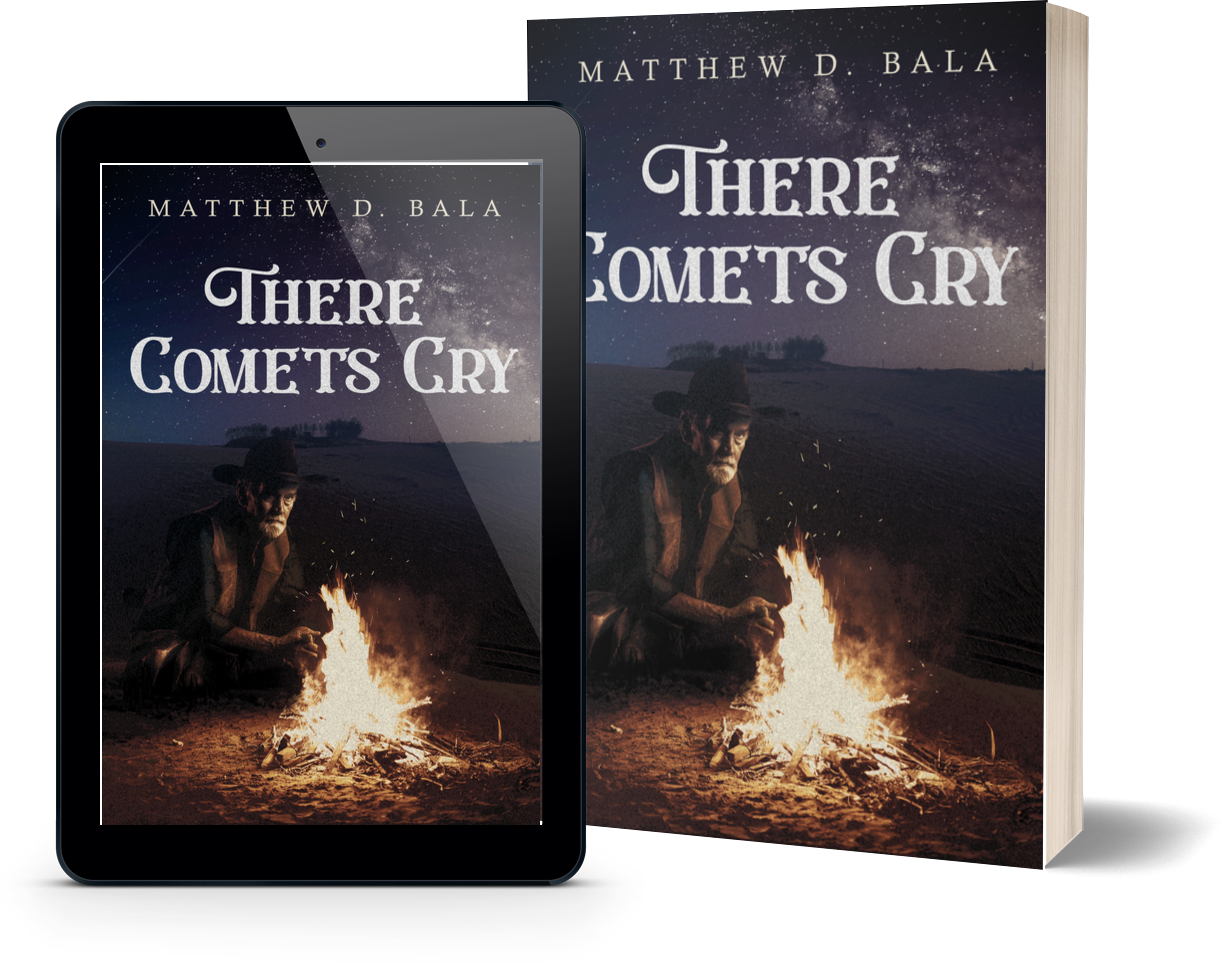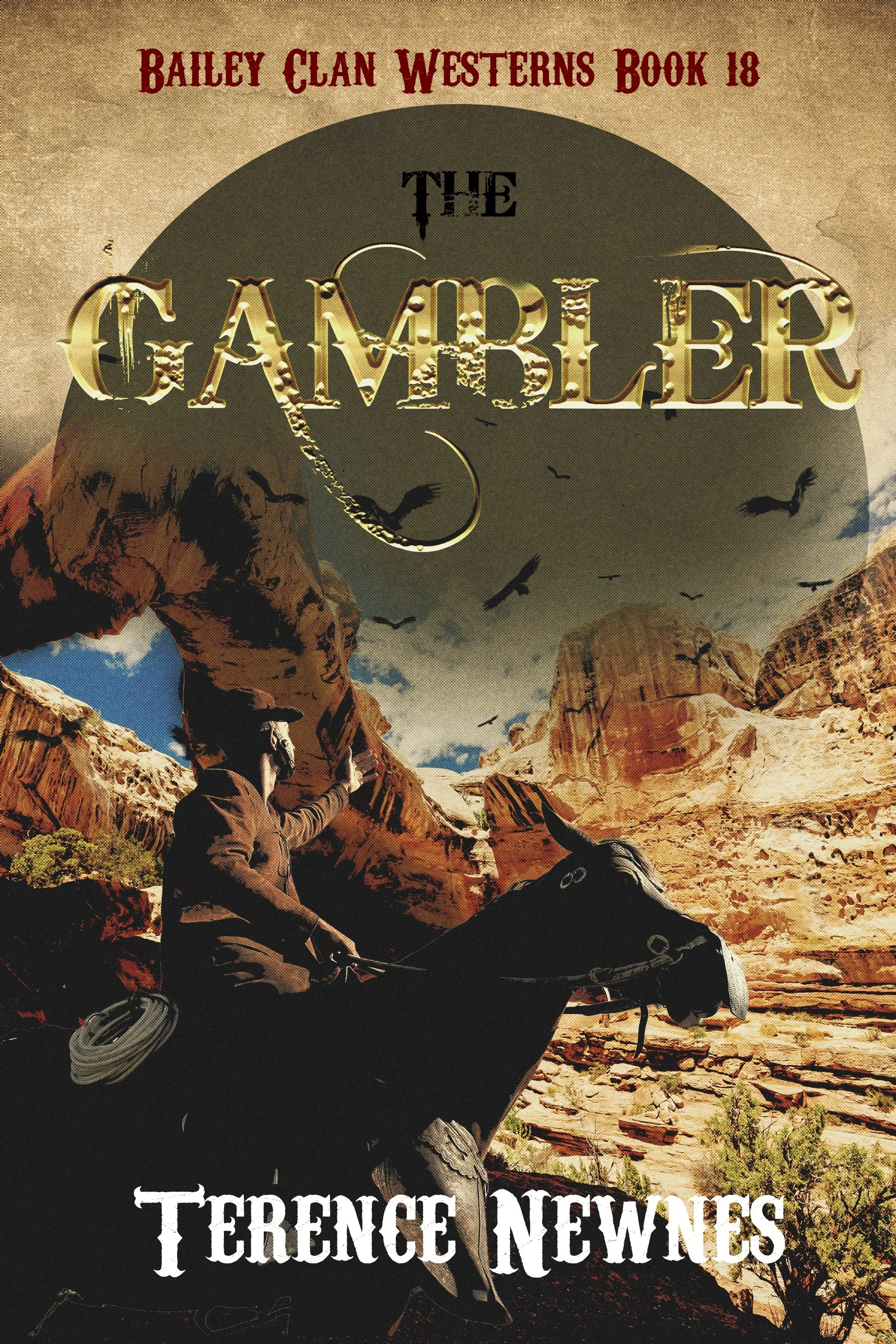There Comets Cry
Book summary
There Comets Cry follows Jorah Kepssel, a reformed gunman turned bounty hunter, as he struggles to leave behind a violent past. Haunted by his ex-gang and accused of heinous crimes, Jorah must reconcile with his brutal history while seeking redemption. Amid danger and vengeance, he fights to save others—and himself.
Excerpt from There Comets Cry
Town of Cherun
He shoots down a tin can behind the saloon, and the bartender tells him he did well. He lumbers atop dog whelks and broken shells back to the hitching post and feeding troughs, where he propped up the ancient containers of spirits and liqueurs. Aching and stretching his back, the man returns the shot metal to the perch and tracks sluggishly to his starting position. Lustrous oil from the gun slicks his index and thumb along the frame; he huffs in a liter of dry air and lets loose with his lungs emptying. The corrugated metals and wrinkled glasses fly up into sparkling shards with fast afterimages of dust and splinters. The bartender praises the sharpshooter’s deadeye, and he asks for his gun back. Grinding his hips along his pelvis, the man steps five paces to the bartender, runs his thumb along the hammer for a moment, and feels the oil rub into the pad of his finger. Controlling the toss of his revolver, the man hands the pistol handle-first to the bartender—a faded dollar left in his palm. He thanks him, and the man nods with his chin and the brim of his hat, winding back into the city street.
The wind fluffs the sand, and the weight of each click of his heel plasters his bones with the geriatric reminder of pistoning and arthritis. Leather grabs from his boots keep telling him—his feet stick to the floor like molasses; a frail communication left between the faculties of his body, a note of his oldness.
He tosses his foot after each imprint into another, throwing his body step after step so that he can get out of the scorching sun. His heel slams into the inn’s step, and he clutches his hips so they don’t pop out. He draws up to a portico, gunpowder stains rubbed into the imported cherrywood of the hotel, and clumps of wood dyed dark green from stems of horse nettle and yucca feed. The inn’s owner saw his daughter scalped, and his son doused in pitch and oil, then set afire like a leper. Talking to him is like playing a cracked drum; beat it however you want, it never sounds the same—never hear what a man would expect.
Some shop owners tossed buffalo gourds and torn garments into watering holes and feeding troughs to make people think Comanches were trying to spit them into a war, to have all these people killed; an end for their daily survival—effigies of the great pioneers early America had raked their spirits to be.
The bell chimes and hushes after three swings, clipping off the rings with the air left waiting. The manager darts his eyes to the man’s soiled attire: blasted cartridges riddle the old sharpshooter’s gun belt, flotsam recessed in his hanging pockets, and a wide-brimmed cap of wiry plant sinew fitted onto his dilapidated skull. His eyes buried into his head, peering back at the innkeeper with two black dots stenciled onto a face either war-torn or work-worn.
The keeper muscles into his elbows that were on the counter when the man had walked in, and now he clutches hand over fist, reaching not underneath the pine countertop for some firearm, but leaving his hands in the open, at both men’s disposals if they so wanted. He dons a white collared Slater filled in with a greased undershirt that barely seeps through his front rucks. Kempt suspenders latch and glue from front shoulder to back, running along the blunt crests of his overweight frame. A frazzled combover lays on his scalp, some ecchymosis shading his head a muted purple that pops along his liver spots.
“Room?”
“Sure. 2 dollars a night.”
“Right.”
The old men fill their share of pressure in the room so that the other cannot, the innkeeper staying stable in his elbows, and the desperado with his hand knuckling along the ridge of his back-holstered knife while he pays the man. The old sharpshooter flattens greasy bills on the counter for the keeper, who then lugs his knuckle out of his palm and pins the dollars along his half-index-finger and ring finger. The melanterite color shows it was recently printed; the old man digs his gray teeth and licks his lips, peering up toward Jorah, posted in a ready stance.
“You a bounty hunter?”
“Nah. Left that long ago. I’m a traveling sheriff.”
“Traveling sheriff. That’d be the day.”
“So how about it? Can I stay here?”
“Yeah.”
The keeper stumbles as he pivots on his left foot to lurch for a room safe and a quarters key posted on a corkboard beside him. His seasoned hands fiddle with the flimsy iron of the key ring and produce a blue-cobalt key that absorbs light more than anything else in the room—or in the whole town, rather. The old sharpshooter stacks his weight into each small pace in a show of either ceaseless anticipation or wishful provocation; he clasps his spurs and heels a foot from the counter’s face and peers darkly into the old man.
The old man has a bite in the corona of his right ear, and the fluff from the desiccated cherrywood beams plasters his whole face with a faint, asbestos tan. His washed opal eyes gaze back plainly, locking eyes but holding no presence or fight behind his black-dot globes. They look into each other, then let off as the room keeps still with the sound of cracking floorboards washing the lobby.
The innkeeper still pans his gaze toward the old man’s broad back as he carefully ambles up the stairwell recessed in the wall facing the door. The old sharpshooter can no longer distinguish the crack of the stair boards from his failing legs; the clicks of infuriated bones furrow into his ears as he shambles up the rest of the stairs, trailing a monotonous string of metallic plucks of his silver spurs to his room at the upper floor’s end. The cherrywood and cedar of the inn are cracked in the plasterwork near his room. Shutting the door, the old man sits in a pine parlor chair from the carpentry out behind the trade store. He unclasps his boots about his ankles and rustles them off, with dusted loam and limestone falling from them; then, he stashes the boots on the side of the bedframe hidden from the door. His desperado gun belt and weathered coat fall to the floor, leaving only his brackish denim pants toughened with hard grime. The bed croaks and groans as he roughs his palm into the bedsheets to check for loose cash or teeth; a rosewood comb and a bent paddle brush clatter on the floor next to his belt, and he ruffles his motley pillow, throwing up his wrinkled sheets to lay on his side.
He nestles his chin into the fat of his creased arm, and the languor of the town breaks him into a hypnotic lull as he stares doll-eyed out the window of his room. The draft humming under his shut door whips up and down his back, and his sore feet grow into reddish inflammation. He scratches his mid-back, atop his liver, and feels his fingers in his gooey flesh, hoping to crush that pain. As a few hours pass, the chronic irritation drives him from his bed to his strewn gun belt. Uncrooking his arm, he levers himself upright, cups his hand around his ankles, and bangs with the other on his back to numb out whatever. The gun belt had been a cheap gift from his time in Mexico; an old vaquero had left it for him on his bedstead the morning after the two had wrangled cattle for a two-mile stretch.
Work was the only thing on his mind back then; he would trek from town to post office to railroad in hopes of having enough money to oil up his pistols and buy tobacco to chew. He was on his way south toward Arizona—the station from Abbott was his only way of travel and home. As he was boarding, he cut his attention from the train car to the corkboard crowded with a yellow flyer that boasted thick, inked numbers. The paper listed a bounty on the head of a woman who shot her husband and bludgeoned his horse. Her face was wrinkled with deep-running crow’s feet, and her eyes were sunken as her mouth sagged with her excess flesh—a woman whose body and mind had fought the sweltering heat of the Chihuahuan desert and lost. Instead of making his way into Jerome, he traveled down to Rio Grande City. He joined a circus show that was already making its tour about the Texan border—they had horses, food, and fire; all they needed was his protection.
It took them one long week to drop off at Austin. The ringleader traded gold nuggets with whoever just to house his posse and him. Jorah was a whole head and shoulders larger than the smartly dressed showman; his arms and legs were stubby with fat and short bones. His meandering mustache and furled sideburns resembled a draconian fiend, here to swindle the populace of their money in the show of the horrors of the world, all gathered in his traveling menagerie.
The ringleader offered him a dollar if he would stay for the show, so the young desperado did. He was fingering the smooth-bore barrel of his revolver as militias bustled around a few shop ramadas—a handful of dirty-faced children roamed in front of the wagon carts reared before the town hall, their caretakers staggered behind, and a rise of murmurs washed the air with heavy faces of anticipation and aggression. The kid audience stood around a large firepit raked with shiny stones and glinting wood. His red coat grew a dark brown with the nightly backdrop, and he produced a small flame atop his fingers and flicked it into a starved flame. The children recoiled, only to grow closer to the orange glow. Flimsy nightshade and faded lantana festooned the carts, and atop those carts peered with white-beaded eyes a band of an immigrant family, an androgynous pantomime, and a veiled cage. The mime was the first to clamber downwards as he twisted along the rod of his spine into a contorted hourglass fitted into a denim corset; the creature flung its leg and knee over the shoulder, and rude pops of bones crackled as loud as the fire. The darkness shrouded his frame—with the fiery shade, his face was chalked with deep white dyes, and his sockets were inked with black. His appearance made the spectacle an anthropomorphic rat with a bulbous snout accented by the contrast of the dye, and his eyes yellowed from the fire. The amorphous family, still in the dark, plucked their ancient strings and rapped their metal pans for an alien discordance that propagated all and every form of discomfort. The pantomime churned in its garbs of patchwork from ladies’ dresses and men’s denim to the unearthly tune, and it slowed the intensity of its movements toward the stars as it inched away from the fire back into the recess of the wagons, returning to darkness. The rasp and twangs of the family paused, and their silhouettes sank away with their sound.

















Praesent id libero id metus varius consectetur ac eget diam. Nulla felis nunc, consequat laoreet lacus id.